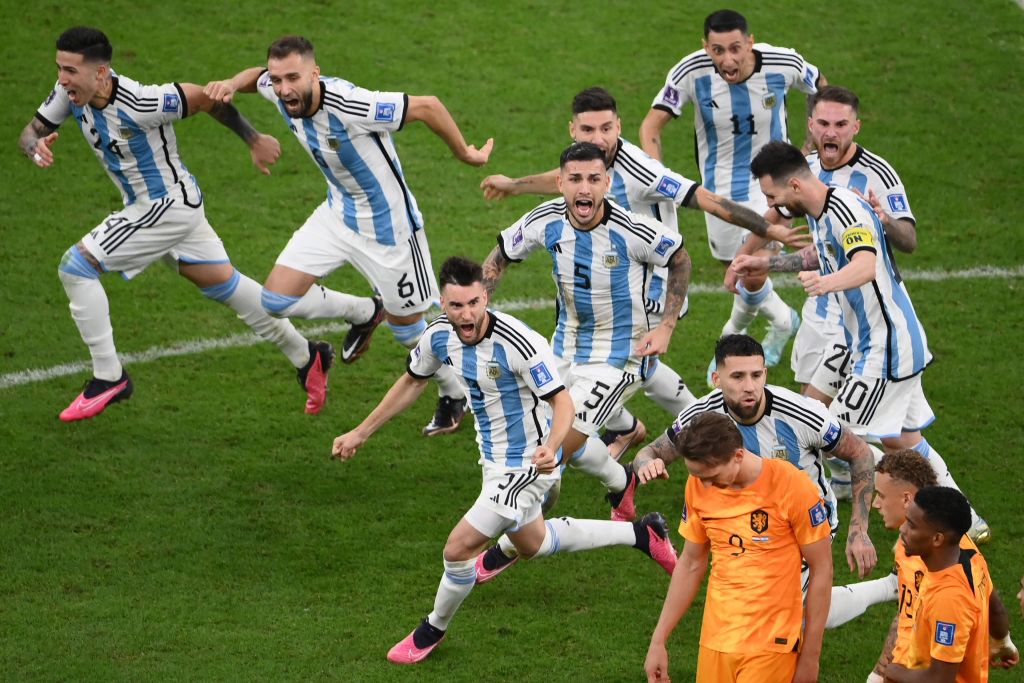With the prospect of Messi closing out his glorious career with the ultimate prize it’s likely most neutral fans will be rooting for Argentina in today’s World Cup final. The only place where that might not be true – apart from Brazil – is England, where there may even be an unlikely revival of the entente cordiale in some quarters. For Argentina have held the title of the ‘team we love to hate’ mantle for some time now.
There have been a few signs of this long simmering animus in the run up to the final with much of the British press placing the blame for the unpleasantness in the quarter final against Holland at the door of the Argentinians – with Martin Tyler recalling Alf Ramsey’s ‘animals’ comment (which referenced their fiery quarter final in 1966) when he interviewed Gary Neville for his podcast.
Argentina’s players will have been schooled in the concept of ‘viveza criolla’, which can be roughly translated as ‘artful lying’
The origins of all this are well-known to World Cup fans: Rattin’s stroppy protest in 1966, then Maradona’s hand ball goal against England in 1986, which rankles not so much, one suspects, because he did it, but because he celebrated it and never acknowledged the injustice. Diego Simeone compounded that grievance by deliberately contriving a red card for David Beckham in the 1998 World Cup. Then there have been the frequent references to the Falkland’s War of 1982 on banners in stadiums and chants and songs from the fans – and sometime even the players.
Is there a defence? The game with Holland was nasty on both sides. And if mocking defeated opponents is ugly when the Argentinian team does it, it is no less so from Kylian Mbappe, who cackled manically after Harry Kane missed that penalty – and Mbappe didn’t have the excuse of a buildup of hostility from a fractious game. England vs France was pretty mild.
As for famous handballs, Thierry Henry’s against the Republic of Ireland (‘The Hand of Frog’ – the Sun) may have been ‘a reflex’ but the French star took the goal and celebrated just the same. So why isn’t he constantly reminded of it? And England fans, if not players, are not averse to the occasional WW2 reference in their sing-alongs.
There’s no doubt Argentinian football has let itself down from time to time. Aesthetes might suggest that the gracelessness associated with Argentinian football is the grit in the oyster, without which its grace and beauty couldn’t thrive. A more prosaic explanation is that it’s just the inevitable product of the hardscrabble backgrounds of so many of the players.
Football in Argentina remains resolutely ungentrified; it’s still a working-class game played and (largely) watched by hard as nails young men from rough and dangerous neighbourhoods. Carlos Tevez, one of the country’s greatest ever strikers, sported irregular teeth, the result of numerous street battles with local gangs. Juan Riquelme experienced the trauma of having his younger brother kidnapped. The same thing happened to the father of Christain Traverso. Gangs have considerable influence at Argentina’s top clubs and put pressure on star players to grant access and favours.
Perhaps it’s no wonder players with backgrounds like that sometimes fall short of the Corinthian ideal. Argentina’s players will have been schooled instead in the concept of ‘viveza criolla’, which can be roughly translated as ‘artful lying’ – the cunning defying of authority through sneaky cleverness. The ultimate example of viveza creolla in action on the football field was the ‘Hand of God’.
The criticism Argentina received for that, combined with the lingering pain over the Falklands, only served to intensify an innate sense of victimisation. In Pete Davies’ book about the 1990 World Cup (All Played Out), he cites the comments of then President Carlos Menem who declared that Maradona and co. would be ‘defending Argentina’ in the World cup in Italy. Not the title, noted Davies, but Argentina itself.
Something of that mindset remains and it produces unusual fervour in players and supporters. Gary Neville countered Martin Tyler by arguing that Argentinians have ‘something inside them’ when they play for the national team. He recalled how ex-teammate Gabriel Heinze used to take to the field with an Argentina shirt under his Manchester United one to give him that extra edge.
But the Anglo Argentinian enmity is unfortunate considering how much Argentinian football owes to Britain. In Jonathon Wilson’s history of Argentinian football Angels with Dirty Faces he chronicles the early days when Gorbals born Alexander Watson-Hutton set up schools in Buenos Aires with football at the heart of the curriculum. Argentina’s first ‘international’ fixture in 1888 featured a team of British immigrants and was played to celebrate the birthday of Queen Victoria.
Despite the ex-pat’s efforts, football took a while to catch on. Wilson records that when a consignment of deflated balls arrived at the docks in Buenos Aires they were mistaken for wineskins or leather caps before finally being listed as ‘items for the crazy English’. Only with an influx of British railway workers was the game popularised.
Those who think that is ancient history might be interested to know that 130 years on Argentina has a player in their line-up called Mac Allister, who plies his trade in Brighton, and whose family, it is said, hail from Fife.
Time to move on. May the best team win.







Comments